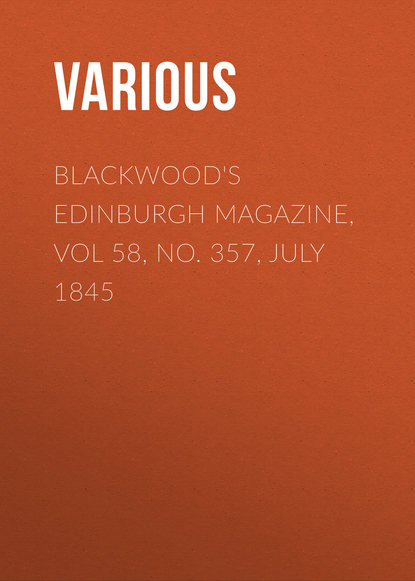По всем вопросам обращайтесь на: info@litportal.ru
(©) 2003-2024.
✖
Blackwood's Edinburgh Magazine, Vol 58, No. 357, July 1845
Автор
Год написания книги
2017
Настройки чтения
Размер шрифта
Высота строк
Поля
The Rose
Where is our rose, friends?
Tell if ye may!
Faded the rose, friends,
The Dawn-child of Day.
Ah, do not say,
Such is youth's fleetness!
Ah, do not say,
Thus fades life's sweetness!
No, rather say,
I mourn thee, rose – farewell!
Now to the lily-bell
Flit we away.
Among the thousand-and-one compositions, in all languages, founded upon the sublime theme of the downfall and death of Napoleon, there are, we think, very few which have surpassed, in weight of thought, in splendour of diction, and in grandeur of versification, Púshkin's noble lyric upon this subject. The mighty share which Russia had in overthrowing the gigantic power of the greatest of modern conquerors, could not fail of affording to a Russian poet a peculiar source of triumphant yet not too exulting inspiration; and Púshkin, in that portion of the following ode in which he is led more particularly to allude to the part played by his country in the sublime drama, whose catastrophe was the ruin of Bonaparte's blood-cemented empire, has given undeniable proof of his possessing that union of magnanimity and patriotism, which is not the meanest characteristic of elevated genius. While the poet gives full way to the triumphant feelings so naturally inspired by the exploits of Russian valour, and by the patient fortitude of Russian policy, he wisely and nobly abstains on indulging in any of those outbursts of gratified revenge and national hatred which deform the pages of almost all – poets, and even historians – who have written on this colossal subject.
Napoleon
The wondrous destiny is ended,
The mighty light is quench'd and dead;
In storm and darkness hath descended
Napoleon's sun, so bright and dread.
The captive King hath burst his prison —
The petted child of Victory;
And for the Exile hath arisen
The dawning of Posterity.
O thou, of whose immortal story
Earth aye the memory shall keep,
Now, 'neath the shadow of thy glory
Rest, rest, amid the lonely deep!
A grave sublime … nor nobler ever
Couldst thou have found … for o'er thine urn
The Nations' hate is quench'd for ever,
And Glory's beacon-ray shall burn.
There was a time thine eagles tower'd
Resistless o'er the humbled world;
There was a time the empires cower'd
Before the bolt thy hand had hurl'd:
The standards, thy proud will obeying,
Flapp'd wrath and woe on every wind —
A few short years, and thou wert laying
Thine iron yoke on human kind.
And France, on glories vain and hollow,
Had fixed her frenzy-glance of flame —
Forgot sublimer hopes, to follow
Thee, Conqueror, thee – her dazzling shame!
Thy legions' swords with blood were drunken —
All sank before thine echoing tread;
And Europe fell – for sleep was sunken,
The sleep of death – upon her head.
Thou mightst have judged us, but thou wouldst not!
What dimm'd thy reason's piercing light,
That Russian hearts thou understoodst not,
From thine heroic spirit's height?
Moscow's immortal conflagration
Foreseeing not, thou deem'dst that we
Would kneel for peace, a conquer'd nation —
Thou knew'st the Russ … too late for thee!
Up, Russia! Queen of hundred battles,
Remember now thine ancient right!
Blaze, Moscow! – Far shall shine thy light!
Lo! other times are dawning o'er us:
Be blotted out, our short disgrace!
Swell, Russia, swell the battle chorus!
War! is the watchword of our race!
Lo! how the baffled leader seizeth,
With fetter'd hands, his Iron Crown —
A dread abyss his spirit freezeth!
Down, down he goes, to ruin down!
And Europe's armaments are driven,
Like mist, along the blood-stain'd snow —
That snow shall melt 'neath summer's heaven,
With the last footstep of the foe.
'Twas a wild storm of fear and wonder,
When Europe woke and burst her chain;
The accursed race, like scatter'd thunder,
After the tyrant fled amain.
And Nemesis a doom hath spoken,
The Mighty hears that doom with dread:
The wrongs thou'st done shall now be wroken,
Tyrant, upon thy guilty head!
Thou shalt redeem thy usurpation,
Thy long career of war and crime,
In exile's eating desolation,
Beneath a far and stranger clime.
And oft the midnight sail shall wander
By that lone isle, thy prison-place,
And oft a stranger there shall ponder,
And o'er that stone a pardon trace,











